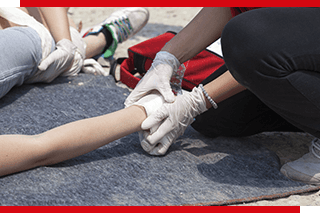The Prehospital Trauma Life Support Course (PHTLS)
Improve the quality of trauma care in your area and decrease mortality. The program is based on a prehospital trauma care philosophy, stressing the treatment of the multi-system trauma patient as a unique entity with specific needs. PHTLS promotes critical thinking as the foundation for providing quality care. It is based on the belief that, given a good fund of knowledge and key principles, EMS practitioners are capable of making reasoned decisions regarding patient care.

The Advanced Medical Life Support Course (AMLS)
This course emphasizes the use of scene size-up, history, interactive group discussion on potential treatment strategies, and s physical exam to systematically rule out and consider possibilities and probabilities in treating patients’ medical crises. The course offers an initial assessment-based approach that progresses to a diagnostic-based approach to quickly develop the best treatment plan.
The Emergency Pediatric Care (EPC) Course
This course focuses on the care of sick and injured children, addressing a full spectrum of emergency illnesses, injuries, and scenarios that an EMS practitioner might encounter. The course provides an in-depth understanding of the pathophysiology of the most common pediatric emergency issues, and stresses critical thinking skills to help practitioners make the best decisions for their patients.
Geriatric EMS (GEMS)
GEMS will have a profound impact on the care of older people in the prehospital setting. The first of its kind, the course has many interesting features and will be especially learner-friendly and on the cutting edge of clinical practice in geriatric emergency medical services.
The proportion of the aged in society today is greater than ever before. Current indications are that approximately 34% of calls for emergency medical services or 3.4 million emergency responses involve patients over the age of 60. This population has specific medical needs that must be met and the GEMS course is designed to address all of those special needs. To ensure quality prehospital care of our older adults, prehospital providers must acquire the additional knowledge, skills, and attitudes that comprise the basic concepts of geriatric medicine, as well as the ability to care for older adults in an empathetic manner.
Bleeding Control for the Injured (B-Con)
This course teaches participants the basic life-saving medical interventions, including bleeding control with a tourniquet, bleeding control with gauze packs or topical hemostatic agents, and opening an airway to allow a casualty to breathe. The course is designed for non-tactical law enforcement officers, firefighters, security personnel, teachers, and other civilians requiring this basic training.
EMS Safety
The EMS Safety Course aims to promote a culture of EMS safety and help reduce the number and intensity of injuries incurred by EMS practitioners in carrying out their work. The course increases the practitioners' awareness and understanding of EMS safety standards and practices that develops their ability to effectively implement them. EMS Safety is the first national and most comprehensive education program of its kind that teaches techniques on how to best achieve safety on the job.
Emergency Vehicle Operator Safety (EVOS)
EVOS aims to promote EMS Safety and reduce the number of crashes, injuries, and fatalities involving EMS vehicles and providers. EVOS trains EMS providers to recognize the specific behaviors that must be changed in order to promote a culture of safe driving. The curriculum covers daily vehicle inspections and proper vehicle maintenance, EMS vehicle operation and the law, mental, emotional, and physical preparedness; spatial awareness, driving under various road and weather conditions; and technological safe-driving aids.
All Hazards Disaster Response (AHDR)
AHDR course aims to meet the need for disaster preparedness by explaining the basic principles and key concepts of disaster management. AHDR describes a systems-based approach to disaster preparedness and response, with a focus on caring for ill and injured patients during a mass-casualty incident or disaster, which involves responding safely to an emergency and includes actions taken to save lives and prevent further damage.
Psychological Trauma in EMS Patients (PTEP)
PTEP addresses psychological trauma and the integral role that EMS practitioners play in mitigating the long-term effects on patients. PTEP course helps practitioners practice interventions and discuss the integration of psychological trauma prevention techniques into their EMS practice.
